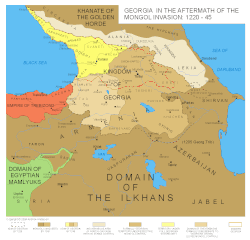Mongol Armenia
| Mongol Armenia | ||||||||||||
|
||||||||||||
|
Georgia (and Armenia) in the aftermath of the Mongol invasion (1220 - 1245).
|
||||||||||||
| Capital | Ani | |||||||||||
| Languages |
Armenian (native language) Oghuz Turkic Mongolian |
|||||||||||
| Religion |
Armenian Apostolic Sunni Islam |
|||||||||||
| Government | Monarchy | |||||||||||
| History | ||||||||||||
| • | Established | 1236 | ||||||||||
| • | Disestablished | 1335 | ||||||||||
|
||||||||||||
Mongol Armenia or Ilkhanid Armenia refers to the period in which both Armenia (during its union with the Kingdom of Georgia) and the Armenian Kingdom of Cilicia became tributary and vassal to the Mongol Empire (the later Ilkhanate) in the 1230s. Armenia and Cilicia remained under Mongol influence until around 1335.
During the time period of the later Crusades (1250s to 1260s), there was a short-lived Armenian-Mongol alliance, engaged in some combined military operations against their common enemy, the Mameluks. They succeeded in capturing Baghdad in 1258, but suffered defeat eight years later.
The Armenian calls for a wider Christian-Mongol alliance against Mameluk Islam, advocated notably by Hayton of Corycus, were ignored by the Latin powers in the Levant, leading to the demise of the European Crusader States and the imminent failure of the Crusades as a whole.
The Armenian Kingdom of Cilicia, or "Lesser Armenia" was formed in the late 12th century, by refugees and migrants from "Greater Armenia". The area was staunchly Christian, as Armenia itself had been the first nation to ever adopt Christianity as its official religion, in the 4th century. Armenians were therefore very friendly to the European Crusaders who began to arrive in the early 12th century. As the Crusades progressed, the Armenian leaders were regular players in the politics of the region, aligning with the Crusader states against the Muslims.
Genghis Khan had died in 1227, and by 1241, the Empire was split up into four smaller independent khanates, which continued to further expand the Empire. The southwestern khanate, known as the Ilkhanate, under the leadership of Genghis Khan's grandson Hulagu, advanced towards Persia and the Holy Land. City after city fell to the Mongols, including some Christian realms in their path. Christian Georgia was repeatedly attacked starting in 1220, and in 1243 Queen Rusudan formally submitted to the Mongols, turning Georgia into a vassal state which then became a regular ally in the Mongol military conquests. This was a common practice in use by the growing Mongol empire – as they conquered new territories, they would absorb the populace and warriors into their own Mongol army, which they would then use to further expand the Empire.
...
Wikipedia

